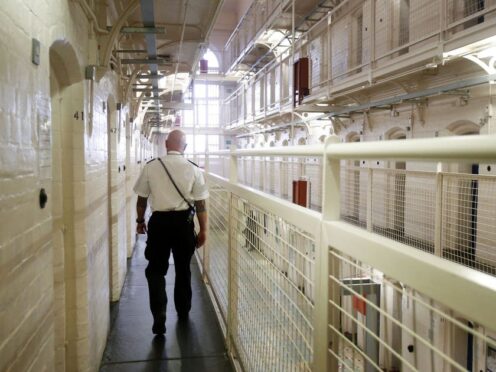
The “most distressed” prisoners serving long-abolished indefinite sentences should be released on compassionate grounds and the move could help free spaces in jails which are almost full, a charity has said.
The Centre for Crime and Justice Studies (CCJS) also urged Justice Secretary Alex Chalk to advise the Parole Board to facilitate the release of those serving the longest periods beyond their tariffs.
Imprisonment for public protection (IPP) sentences were introduced in 2005 to prevent serious offenders who did not warrant a life sentence being released when they still posed a danger to the public.
Despite being scrapped in 2012 – which the Ministry of Justice (MoJ) said was “due to the inconsistent and more frequent application of these sentences than was intended” – almost 3,000 criminals remain behind bars after being given such a sentence.

Offenders released from prison on licence while serving an IPP sentence currently have to wait at least 10 years before they can have their licence reviewed by the Parole Board.
There have been calls to cut that to five years or even three.
Campaigners have characterised the continuation of IPP sentences as a miscarriage of justice akin to the Post Office scandal.
In its report, the CCJS said reviews of resentencing for all IPP prisoners and all forms of preventative detention in the UK should be ordered.
It has also called for a recovery and reparations programme to “address the disastrous personal consequences of the sentence” for prisoners.
Those serving the sentences should receive better access to visits and better cell conditions, the charity added.
In February 2023, the Government rejected a recommendation the Justice Select Committee made the previous year, which called for all IPP prisoners to be re-sentenced.
The committee rejected what it said were the Government’s claims that the system for release needed to be maintained for the public’s protection.
It also called for the current time period after which prisoners can be considered for the termination of their licence following release to be halved from 10 years to five.

The charity said the release of IPP prisoners would have a “large and immediate impact” on reducing pressures on prisons, which are expected to run out of space by the spring.
A cut in IPP licence periods – bringing automatic licence termination down from 10 years to five following release – will not solve the crisis because of the high proportion of recalls occurring within the first five years, the CCJS said.
The UN special rapporteur on torture has called for a review of IPP sentences on the grounds they resemble the practice.
At least 90 IPP prisoners are believed to have taken their own lives between 2005 and 2023 and the reforms would also help slow that, the charity said.
CCJS director Richard Garside said: “This really is a scandalous situation. The current IPP ‘Action Plan’ remains tied to an outdated and discredited approach to IPP.
“Something has to change, otherwise we will be sat here again, in another 12 years’ time since these ‘indefinite’ sentences were abolished, with this deadly crisis still going.
“After 21 years, at least 90 lives lost, and hundreds of families broken, surely it is time for the Government to grasp the nettle and take decisive action.
“I urge the Government to adopt our recommendations without delay, to end the political inertia that has allowed this stain on the British justice system to persist for over 20 years.”
A Ministry of Justice spokesperson said: “We have reduced the number of unreleased IPP prisoners by three-quarters since we scrapped the sentence in 2012, with a 12% fall in the last year alone where the Parole Board deemed prisoners safe to release.
“We have also taken decisive action to curtail licence periods and continue to help those still in custody to progress towards release including improving access to rehabilitation programmes and mental health support.”

Enjoy the convenience of having The Sunday Post delivered as a digital ePaper straight to your smartphone, tablet or computer.
Subscribe for only £5.49 a month and enjoy all the benefits of the printed paper as a digital replica.
Subscribe